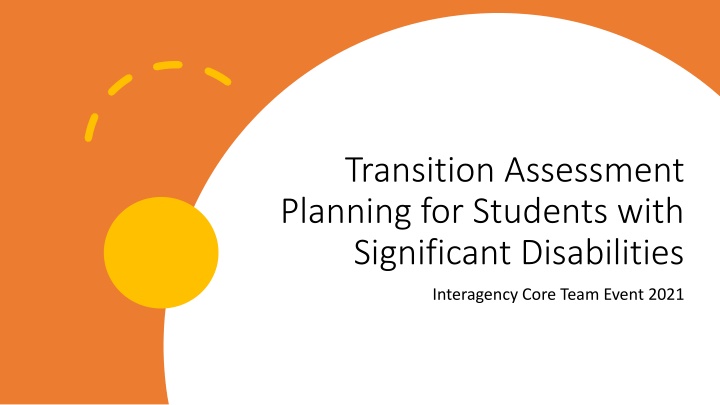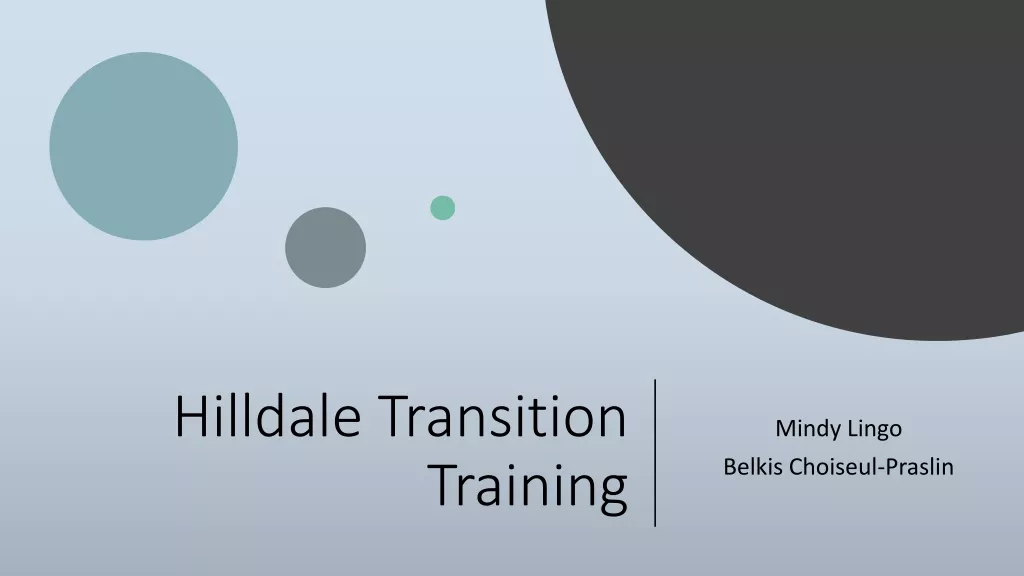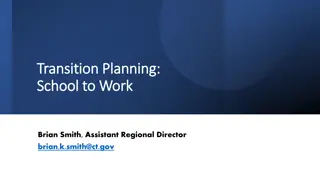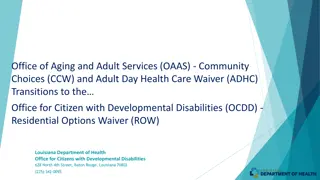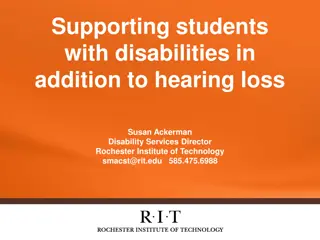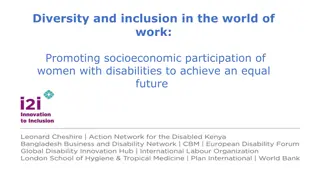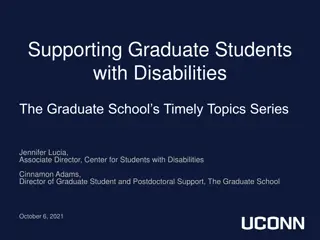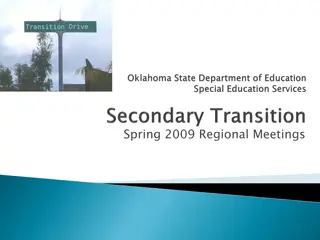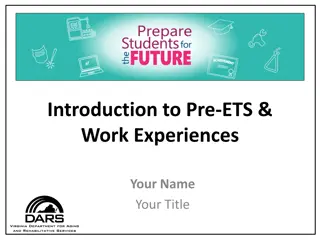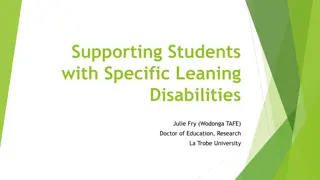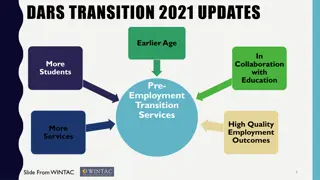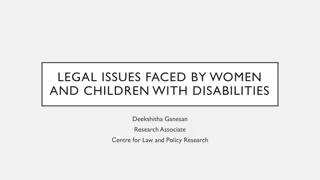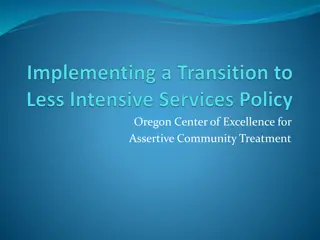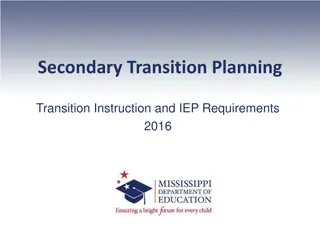Transition Assessment Planning for Students with Significant Disabilities
the ongoing process of collecting data on individual needs, preferences, and interests for students with significant disabilities. Discover key questions and tools to assist IEP teams in planning assessments and defining goals.
Download Presentation

Please find below an Image/Link to download the presentation.
The content on the website is provided AS IS for your information and personal use only. It may not be sold, licensed, or shared on other websites without obtaining consent from the author.If you encounter any issues during the download, it is possible that the publisher has removed the file from their server.
You are allowed to download the files provided on this website for personal or commercial use, subject to the condition that they are used lawfully. All files are the property of their respective owners.
The content on the website is provided AS IS for your information and personal use only. It may not be sold, licensed, or shared on other websites without obtaining consent from the author.
E N D
Presentation Transcript
Transition Assessment Planning for Students with Significant Disabilities Interagency Core Team Event 2021
Ben Beatty-Owens, Transitional and Employment Services Specialist, Special Educator, Essex High School Bill Sugarman, Regional Manager Barre & Morrisville, Department of VocRehab Bonnie Haug, Vocational Rehabilitation Transition Counselor, serving in school youth and young adults, Assessment Specialist John Spinney, Postsecondary Transition and Disability Equity, Student Support Services Division, Agency of Education Mickey Bonges, Employment Specialist, Essex High School Taya Tarr, VR Counselor, Division for the Blind and Visually Impaired Tracy Roux, Assistive Technology Access Specialist, Department of VocRehab Who we are
Brief Overview of the Workshop Introduction of the Transition Assessment Planning for Students with Significant Disabilities Experiences from Employment Specialist from Essex High School Sequence of events when working with youth with VR Transition Counselors and Youth Employment Specialist Assistive technology services Resources for assessments
Transition Assessment Planning for Students with Significant Disabilities is an ongoing process of collecting data on the individual s needs, preferences, and interests as they relate to the demands of current and future working, educational, living, and personal and social environments. Assessment data serve as the common thread in the transition process and form the basis for defining goals and services to be included in the Individualized Education Program (IEP) (The Division on Career Development and Transition of the Council for Exceptional Children)
Key Questions 1) Where is the student presently? 2) Where is the student going? 3) How does the student get there? Transition Assessment Planning Form This tool is very helpful for IEP teams planning for what assessments will be necessary.
Experiences of an Employment Specialists at school Post Secondary Assessment for students on IEP s Tips - Simple and consistent assessment for all programming works best Build systems that are accessible and that you can individualize Make sure Assessment happens before planning After written assessment, follow up with in person shadows, work trials and, or formalized work experiences Soft skills for employers are more important than hard skills. Employer know how to and like training Hard skills
Dear Students & Families Please join us for the Annual EHS Adult Services Informational via Zoom Thursday, October 8th, 2020 5:00 p.m. 7:00 p.m. Learn more about transition from many of the following: VocRehab VT, Project Hire, HowardCenter, Transition II, Inc. Champlain Community Services, Northwestern Counseling & Support Services, Vermont Center for Independent Living, Avenue 7, Green Mountain Self Advocates SUCCEED, Think College Vermont, Project Search, College Steps, Vermont Family Network, Office of Public Guardian
Sequence of events when working with youth ONLINE (NO ACCOUNT LOG IN REQUIRED): CAREER ONE STOP * (interests, skills, work values) https://www.careerinfonet.org Self-reported skills assessment. Has a resume builder. Occupational videos. No log in or account required. CareerOneStop: Skills Match https://www.careerinfonet.org/skills CareerOneStop MySkillsMyFuture https://www.myskillsmyfuture.org CareerOneStop: Interest Assessment: https://www.careeronestop.org/Toolkit/Careers/interest-assessment.aspx (essentially the same as the O*Net Interest Profiler) CareerOneStop: Work Values Matcher https://www.careerinfonet.org/workvalues CAREER INDEX PLUS * (interests, abilities, skills, values) https://www.thecareerindex.com/dsp Self-reporting style that matches to careers based on physical capacity, work conditions, and traits. MY NEXT MOVE ONET * (interest profiler, suitable for youth) https://www.mynextmove.org/ https://www.mynextmove.org/explore/ip
VocRehab VocRehab Assessments that require login Assessments that require login ON PAPER: TRANSFERRABLE SKILLS SCALE * (self-rated skills) CDM CAREER DECISION-MAKING SYSTEM LEVEL 1 * (interests; easy, low level readers, not for nonreaders, suitable for youth) CDM CAREER DECISION MAKING SYSTEM LEVEL 2 * (interests; intermediate readers) SDS SELF DIRECTED SEARCH STANDARD * (interests; Holland Codes) ONLINE: WOWI World of Work Inventory * (interests, abilities, personality) CAREER SCOPE * (interests, aptitude/abilities, personality) VIRTUAL JOB SHADOW * (exploring occupations and related activities, suitable for youth) TRANSFERRABLE SKILLS SCALE * Online version. (self-rated skills, based on prior training or experience, may be suitable for youth who have had some work experience)
Importance of Assistive Technology Importance of Assistive Technology For most people technology makes things easier. For people with disabilities, however, technology makes things possible. - Mary Pat Radabaugh, Director of IBM National Support Center for Persons with Disabilities, 1988 Assistive Technology mentioned in all three Transition Assessment Domains. AT from school and home will likely still be relevant for work. Important to incorporate tools early on to increase success later in life.
AT AT Who, How, and When Who, How, and When Schools have initial responsibility to supply AT. This is documented in the IEP. Occupational/Physical therapists, Speech and Language Pathologists, Learning Specialist, Special educator, etc. are among the Who . The Vermont Assistive Technology Program can help research ideas. There are 3 AT Try-Out Centers located throughout the state. Pre-transition age: refer directly to the AT Program. The sooner the better! Transition age: refer through VR for extra services. What does considering AT look like? SETT Framework Quality Indicators for AT
Resources Assessment Resources Free Transition Assessments A-Z Guide Transition Assessments NTACT Age Appropriate Transition Assessment Toolkit Transition Planning Tools: Transition Planning Map Example Transition Planning Map VocRehab- Career Assessment Preferred Tools Checklist
AT Resources The Vermont Assistive Technology Program 1-800-750-6355 www.atp.vermont.gov Assistive Technology Inventory: www.vt.at4all.com Joy Zabala s SETT Framework for considering Assistive Technology SETT Documents (joyzabala.com) Quality Indicators for Assistive Technology Services Matrix 6: AT in Transition - Quality Indicators for Assistive Technology Services (qiat.org) Student Self-Evaluation Matrix - Quality Indicators for Assistive Technology - Post Secondary (qiat-ps.org)
Helpful Resources: Coordination with Guidance around Act 77 (Don t Duplicate!) When applicable - Designated Agencies, YPD, Jobcorps Virtual Job Shadow The Caeer Game Dr. Kit Career Videos Teachers Pay Teachers Families are the best and most important resource we rely on
